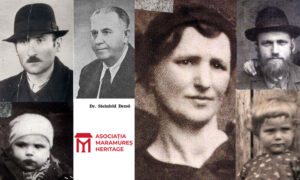Comunitatea evreilor din Ocna Șugatag
Comunitatea evreilor din Ocna Șugatag sa format pe la finalul secolului XIX și aparținea de comunitatea sine stătătoare din Berbești. La recensământul din anul 1941 (realizată de Ungaria) s-au declarat evrei 117 de persoane și toți aveau ca limba maternă idiș.
Majoritatea evreilor din Ocna Șugatag se ocupau cu comerțul cu lemne și fructe de pădure, multe dintre aceste produse fiind comercializate de ieri în afara țării.
Primul rabin al comunității a fost ales abia în anul 1930. Iekutiel Iehuda Gross a fost rabin timp de 14 ani, însă acesta a fost ucis în Auschwitz alături de enoriașii săi.
Evreii din Ocan Șugatag au suferit chiar și înainte de deportările din 1944. În anul 1941 autoritățile maghiare au deportat în Galiția ocupată de germani evreii declarați apatrizi. Aceștia au fost uciși în masacrul de la Kameaneț-Podilskîi de către naziști.
Peste doar trei ani, mai exact în 19 aprilie 1944, evreii rămași în Ocna Șugatag au fost adunați în sinagogă de către autoritățile maghiare, bătuți și percheziționați, pentru ca ulterior să ajungă în ghetoul din Berbești. În mai 1944 au ajuns în ghetoul din Sighetu Marmației, iar ulterior au fost deportați în Auschwitz. Majoritatea dintre cei ajunși aici au fost uciși.
Ultimii doi evrei din localitate au fost recenzați la recensământul din anul 1992. Azi în Ocna Șugatag nu mai trăiesc evrei.
Az Aknasugatagi zsidó közösség a 19. század végén alakult és a független Bárdfalvi közösséghez tartozott. Az 1941-es (Magyarország által végzett) népszámláláson 117-en vallották magukat zsidónak és mindegyiküknek jiddis volt az anyanyelve.
Az Aknasugtagról származó zsidók többsége fa és erdei gyümölcsök kereskedelmével foglalkozott, ezek közül a termékek közül külföldön árultak sokat.
A közösség első rabbiját csak 1930-ban választották meg. Yekutiel Yehuda Gross 14 évig volt rabbi, de hiveivvel együtt Auschwitzban megölték.
Az Aknasugatagi zsidóság már az 1944-es deportálások előtt is szenvedett. 1941-ben a magyar hatóságok a hontalanná nyilvánított zsidókat deportálták a németek által megszállt Galíciába. Itt a nácik a Kameaneț-Podilskîi-i mészárlásban ölték meg őket.
Alig három évvel később, egészen pontosan 1944. április 19-én az Aknasugartagon maradt zsidókat a magyar hatóságok összegyűjtötték a zsinagógába, megverték és átkutatták, hogy később a Bárdfalvi gettóba kerüljenek. 1944 májusában a Máramarosszigeti gettóba hurcolták őket, majd Auschwitzba deportálták. Az ide kerültek többségét megölték.
Az 1992-es népszámláláson még két személy vallotta magát zsidónak. Ma már nem élnek zsidók Aknasugatagon.
The community of Jews from Ocna Șugatag, Maramureș county, Romania today was formed at the end of the 19th century and belonged to the independent community from Berbești. In the 1941 census (conducted by Hungary), 117 people declared themselves Jewish and all of them had Yiddish as their mother tongue.
Most of the Jews from Ocna Şugatag were engaged in the trade of wood and forest fruits, many of these products being traded outside the country since yesterday. The first rabbi of the community was only elected in 1930. Yekutiel Yehuda Gross was rabbi for 14 years, but he was killed in Auschwitz together with his parishioners.
The Jews of Ocna Şugatag suffered even before the deportations of 1944. In 1941, the Hungarian authorities deported Jews declared stateless to Galicia occupied by the Germans. They were killed in the Kameaneț-Podilskîi massacre by nazis.
Just three years later, on April 19, 1944 to be exact, the Jews remaining in Ocna Șugatag were gathered in the synagogue by the Hungarian authorities, beaten and searched, to later end up in the Berbești ghetto. In May 1944, they arrived in the Sighetu Marmației ghetto, and were later deported to Auschwitz. Most of those who got here were killed.
The last two Jews from the locality were reviewed in the 1992 census. Today, there are no more Jews living in Ocna Șugatag.


Foto YadVashem




